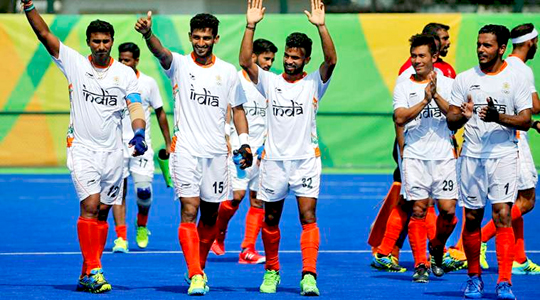Rio de Janeiro, Aug 12: The pendulum decided to swing late; and it swung as if on an overdose of Dianabol. With six minutes left, Holland leading 2-1, India had a penalty corner. Not just one as it transpired but five in quick succession. The hooter had already gone.
In the killing tension, India misfired one after the other, the fifth forcing Sander Baart, the Dutch defender to save on the line. Dutch coach Max Caldas’ pumped his fists in celebration; the 2-1 win over India well-earned and hugely fulfilling. India trooped off failing to draw the game but massive lessons to be learnt before playing Canada. For the record, a quarter-final place already confirmed but a win over Canada would ensure a possible 3rd place in Group B.
After a goalless first two quarters, Holland opened the scoring in the 32st minute through Rogier Hofman. India equalized in the 38th minute, off a penalty corner flick by VR Raghunath. The match-winner converted by Mink van der Weerden came in the 54rd minute off the Dutch 4th penalty corner.
After a 3-3 draw against Argentina in the opening match, the Dutch had it easy against Canada thrashing them 7-0 and then carving up Ireland 5-0. India was the superior side the Dutch encountered after Argentina and the first two quarters showed exactly that sentiment. Both teams played carefully; almost like measuring each pass. Errors were minimum and the play wasn’t fancy, considering the skills at the disposal of both the sides. It also showed the respect that Holland had for India. Most of the play in the 1st quarter was confined to the midfield, a few forays rarely reaching the top of the circle. The first chance for Holland came in the 2nd quarter, 19th minute, when Valentin Verga took a shot which was saved by PR Sreejesh. For the Indian goalkeeper, it was another brilliant display under the bar. It was a slightly different Sreejesh; soft on the pads and not taking too many risks with his outward movement, the Indian goalkeeper waiting for the ball to come before using his pads and gloves. In a swift movement, Holland found itself inside the Indian striking circle but Robert van der Horst’s stiff shot was padded away by Sreejesh.
At the end of the 2nd quarter, both teams were tied goalless. It was like a chess game; both coaches refusing to commit players upwards, fearing counter-attacks. But finally something had to give. Holland earned their 1st penalty corner in the 31st minute and Mink’s flick rebounded off the pads of Sreejesh. Hofman, lurking nearby, swooped and struck the opening salvo. Holland led 1-0.
Stung, India showed pace on the flanks and a few good runs by SV Sunil and Akashdeep Singh rattled the Dutch a bit. India was pushing. Showing good possession, they earned their 1st PC which Dutch goalkeeper Jaap Stockmann saved off Rupinder Pal Singh. But the umpire had pointed for a second PC. Raghunath came up and his flick was low, going past the feet of two Dutch defenders to enter the left corner of the Dutch goal. India had equalized and the match was on.
Momentum is lost by rash decisions and for India the 41st minute in the match saw two yellow cards for Sunil and Raghunath. Sunil’s was on the run, his stick prodding the defender. But Raghunath’s was a childish act. His elbow went into the face of the Dutch defender and India had to defend for five minutes with nine men and a further five minutes with ten. But the momentum had shifted. Sreejesh and the defense played a stellar role keeping the Dutch away. Raghunath was back on the pitch in the 51st minute. But the Dutch were riding high by then. After Sreejesh saved the 3rd penalty corner, Mink was successful with the 4th. Holland led 2-1.
India’s structure, so strong in the first two quarters, was now shaky. The forwards had played the 3rd quarters as full time defenders. But they moved, desperate for the equalizer. India had a PC in the 57th minute. Surprisingly, Holland became ultra-defensive. India piled on the pressure and in the end minutes, they hovered in and around the Dutch striking circle. The thriller started with six seconds left. By the time, the ball was injected, the hooter had gone. Five consecutive penalty corners were given by the umpire with one referral in between by the Dutch players rejected by the video umpire. Rupinder Pal Singh took the 4th and 5th flicks. Raghunath came on for the 6th and 7th. And then Rupinder came back for the 8th which almost slipped in except for Baart who stopped the ball on the line.
It was India’s second defeat in the Group with two wins against Ireland and Argentina. India play Canada on Friday and a win should ensure a 3rd place in Group B. India have a hundred percent record against the Canadians in the Olympic Games winning three out of three.






Comments
Add new comment